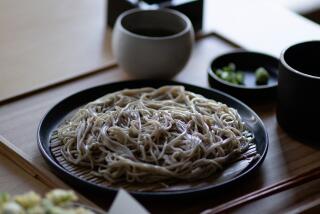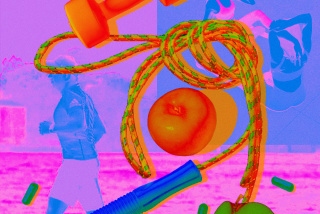Opinion: Are L.A.’s gluten-free, grass-fed foodies making you crazy?
Whenever my mom is planning a family dinner, she always does the rounds before grocery shopping to see what dietary restrictions we’re currently imposing on ourselves. “Eating disorders,” she calls them.
We’re an annoying bunch, I realize, but it’s not like she doesn’t fit right in. My brother recently made us a delicious dinner, but he had to tweak the menu because my mom wanted to stay away from gluten. That’s not because she’s allergic to wheat protein but because she’s allergic to gaining weight. If she puts on one pound, she breaks out into hives.
Which is to say, our diets are very L.A. Where else — besides Gwyneth Paltrow’s house — would you find people en masse who turn up their noses at store-bought apple juice but easily fork over $8+ for a fresh-pressed version at the hipster juice bar? Calories are calories and apple juice is apple juice. And yet, I’m an absolute sucker. My favorite L.A. attraction is the neon Kombucha sign I pass on my way home from work.
In Sunday’s Op-Ed pages, David Sax, author of “The Tastemakers: Why We’re Crazy for Cupcakes but Fed Up with Fondue,“ gave Angelenos a little ribbing, chronicling his last visit to L.A. by what his friends would and wouldn’t eat. These are my people, I thought as I read it. But then came Sax’s reality check:
“There are few cities that can compete with Los Angeles for the sheer energy its residents pour into health and diet trends. This town is the world leader in anxiety over what you should, and shouldn’t, be eating. That’s not necessarily a good thing. Having spent the last few years studying the evolution of various food trends, it’s become clear no food trend is more powerful, and potentially dangerous, than one that targets health and diet,” Sax wrote. “Health food trends continue to grow because they are a cash cow.”
He’s right, of course. Take, for example, the low-fat food craze that pedaled processed meals with less than 3 grams of fat but a ton of high-fructose corn syrup, thereby turning us into (fatter) sugar addicts. As Jacques Peretti explained in an illuminating 2012 article for the Guardian:
“By the mid-’80s, health experts such as professor Philip James, a world-renowned British scientist who was one of the first to identify obesity as an issue, were noticing that people were getting fatter and no one could explain why. The food industry was keen to point out that individuals must be responsible for their own calorie consumption, but even those who exercised and ate low-fat products were gaining weight. In 1966 the proportion of people with a BMI of over 30 (classified as obese) was just 1.2% for men and 1.8% for women. By 1989 the figures had risen to 10.6% for men and 14.0% for women. And no one was joining the dots between [high-fructose corn syrup] and fat. Moreover, there was something else going on. The more sugar we ate, the more we wanted, and the hungrier we became.”
Yikes, right?
Obviously, the surest way to avoid being duped by health fads is to shop the perimeter of the grocery store and to buy organic. But that still leaves a lot of confusing grey area. For example: You’ll find potatoes in the produce section, but aren’t they carb bombs that cause our blood sugar to spike and are partly to blame for the obesity epidemic? For every new lettuce leaf we’re falling in love with (“dandelion greens are the new kale,” if you didn’t know) there’s an ever-growing list of foods that fall out of favor because someone started a bad rumor about them. Like eggs, for instance? Are the yolks OK to eat or not?
Chris Woolston recently sorted out the confusion around today’s most slandered foods — potatoes, eggs, gluten, red meat — in The Times’ Health section. It’s an instructive read.
And the best part for people exhausted by having to keep up with L.A.’s ongoing food issues is the bottom line: Forget the food fads and just eat whole meals.
More to Read
A cure for the common opinion
Get thought-provoking perspectives with our weekly newsletter.
You may occasionally receive promotional content from the Los Angeles Times.







